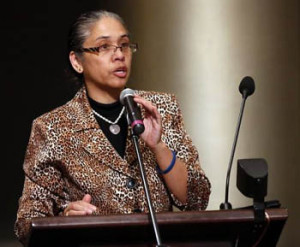
Emergency Services Director Renee Domingo speaking to the City Council
City employees in Oakland and San Leandro appear to live and work by the motto “it’s better to beg for forgiveness than to ask for permission.” While most city councils rubber stamp whatever proposals city staff puts before them – an easier task than actually reading and analyzing long and boring reports -, some proposals are so clearly contrary to the public benefit that they are not politically tenable for council members to knowingly pass. In those situations, staff – most assuredly with the blessing of the City Manager/Administrator – may give the Council an “edited” version of the facts behind it. Whether the purpose is to deceive council members or provide them with plausible deniability can be discerned by how the member react once the true facts are uncovered.
Oakland city staff’s quest to build the Domain Awareness Center (DAC), a facility that would centralize the feeds from hundreds of cameras and license plate readers throughout the City, is a perfect example of how this works. Internal e-mails obtained through the California Public Records Act make it clear that the actual purpose of the DAC is to track and subvert the activities of political protesters and labor activists in the city and port of Oakland. However, in public meetings, both staff and Councilmembers have only referred to the alleged crime-fighting uses of the DAC. Finally, at the last meeting of the Council’s Public Safety Committee, Emergency Services Director Renee Domingo, who has spearheaded Oakland’s DAC project, was forced to admit that there is no data showing that existing DACs in other cities have helped to either reduce or solve crimes.
While there might be some room for argument about whether misleading the Council as to the purpose for the DAC is actually “lying”, it is absolutely clear that Ms Domingo deceived the Council about Science Applications International (SAIC), the company that was hired to build the DAC. SAIC is a large military contractor which, among other things, works in the development, building and deployment of nuclear weapons. Under Oakland’s 1988 anti-nuclear ordinance, the City cannot award contracts to any company that is involved with nuclear weapons. Internal e-mails show that Domingo was aware that this was a problem in February 2013, but she didn’t mention anything about it to the City Council and the Council indeed went on and hired SAIC to build the first phrase of the project. According to Domingo, she first heard about SAIC’s non-compliance in August,when activists brought it up – but that’s contradicted by the e-mails alluded to above.
Domingo is now proposing that the Council contract with called Schneider Electric to build phase II of the DAC. A simple google search of “Schneider Electric” and “nuclear weapons” leads to marketing materials from the company where it describes one of its main applications a being “nuclear weapons handling systems.” It’s still unknown whether Domingo failed to do her due diligence or just hoped that activists wouldn’t find out.
No member of the Oakland City Council has held staff accountable for deceiving them and for having the City knowingly enter into a contract that violated the City’s own laws. Councilmember Dan Kalb campaigned on “restoring trust in City Hall“, and yet he has meekly accepted staff’s unethical behavior seemingly without a second thought. While Kalb is not for re-election, his colleague Libby Schaaf, who has also failed to question staff over their duplicity, is running for Mayor of Oakland. Her “no need for accountability” attitude is echoed by incumbent Mayor Jean Quan.
Things are no better in San Leandro. Chief of Police Sandra Spagnoli routinely gives the City Council information that she knows to be false. She has lied about things as easy to verify as the number of license plate scanners the Department has and the effects of realignment in the City. But she also gave the Council false information about marijuana, the number of complaints they get about chickens and the dangers of overpollination. A few months ago, the City had to settle a lawsuit brought by men after the Chief issued a press release falsely accusing them of attempting to engage in public homosexual sex.
Not only does the Chief routinely lie to the City Council, but she has also broken the law. In 2012, the Chief was caught using Police Department staff and resources to get citizens to lobby the City Council against a proposed marijuana dispensary. That violates both the San Leandro Municipal Code and the California Government Code. Though City Council members are well aware of the Chief’s unlawful attempt to manipulate the democratic process, they have not called her on it. This year, both Mayor Stephen Cassidy and Councilmember Pauline Cutter are running for re-election.
The Chief is not the only “truth impaired” member of staff in San Leandro. When City staff decided to change the Zoning Code as a tactic in a pending lawsuit, city they explained the change as being a “routine update of the code” and only acknowledged the actual motive behind it after citizens like me brought it up repeatedly at public meetings. After the acknowledgement, Mayor Stephen Cassidy made some noise about being more open with the community in the future, but did not take staff to task for their repeated attempts at deception.
It’s difficult to know what we can do to restore ethics and accountability in City Hall – both in San Leandro and in Oakland. Electing the right people has to be part of the solution, but candidates with integrity are few and far between. My strategy – exposing bad behavior at City Hall -, has seldom been an impetus for change. Is local democracy just broken and, if so, can it be fixed?

 It’s worse than I thought, but is it intentional or just careless?
It’s worse than I thought, but is it intentional or just careless? The new City Manager, Chris Zapata, started work yesterday (1/30/12). He will be at the City Council meeting on Feb. 6th, and will be introduced to the community at the “Coffee with the Mayor” on Feb. 10th t 8:00 am, both at the City Council chambers in City Hall.
The new City Manager, Chris Zapata, started work yesterday (1/30/12). He will be at the City Council meeting on Feb. 6th, and will be introduced to the community at the “Coffee with the Mayor” on Feb. 10th t 8:00 am, both at the City Council chambers in City Hall.